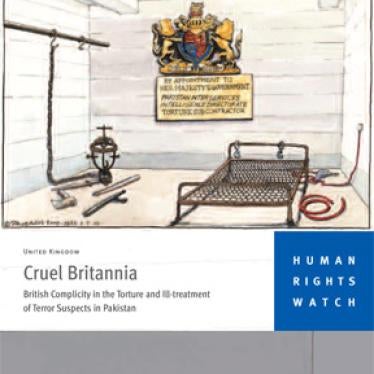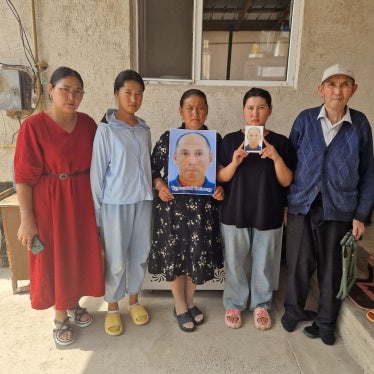Eight years of global efforts to combat terrorism have taught us that the use of torture and ill-treatment is deeply counterproductive. It serves as a recruiting sergeant for terrorist organizations and undermines the moral legitimacy of governments who rely on it. One would have thought the British government with its long practical experience, knew this - quite apart from the absolute moral repugnance of the use of torture. But the official whitewash surrounding the complicity of UK intelligence and security agencies in torture in Pakistan, with ministers repeatedly rejecting calls for an independent judicial inquiry, tells us otherwise.
Human Rights Watch's new report, Cruel Britannia: British Complicity in the Torture and Ill-treatment of Terror Suspects in Pakistan, provides accounts from victims and their families about the cases of five UK citizens of Pakistani origin: Salahuddin Amin, Zeeshan Siddiqui, Rangzieb Ahmed, Rashid Rauf and a fifth individual who wishes to remain anonymous. I was the lead researcher in a year-long team effort.
We found they five were tortured in Pakistan between 2004 and 2007 and ill-treated by the military-controlled Inter-Services Intelligence (ISI) agency, the civilian-controlled Intelligence Bureau (IB), and possibly other Pakistani security agencies. The accuracy of their accounts of mistreatment has been confirmed by Pakistani and British security and intelligence officials.
Of course, primary responsibility for the use of torture against these individuals lies with the Pakistani authorities. Human Rights Watch has no evidence of UK officials directly participating in torture. But British complicity is clear.
It is inconceivable that Britain was unaware of the systematic use of torture in Pakistan. In fact British officials engaged in acts that virtually required that they knew about the use of torture in these cases. The victims have described meeting British officials while detained in Pakistan. In some cases this happened shortly after sessions in which the individuals had been tortured, when it was likely that clear and visible signs of torture were present. British officials supplied questions and lines of enquiry to Pakistan intelligence sources in cases in which detainees were tortured. Britain was also putting pressure on Pakistani authorities for results. In this environment, passing questions and offering other cooperation in such cases without ensuring that the detainees were treated appropriately was an invitation, if not an incitement, to abuse.
Members of Pakistani intelligence agencies have corroborated information from detainees that British officials were aware of specific cases of mistreatment. They have said that British officials knew that Pakistani intelligence agencies routinely tortured detained terror suspects - what Pakistani officers described as their being "processed" in the "traditional way." Officials describe being under immense pressure from the UK and the United States to "perform" in the "war on terror," and reported that "we do what we are asked to do."
For example, Pakistani intelligence sources described Salahuddin Amin as a "high pressure" case, saying that the British (and American) agents involved were "perfectly aware that we were using all means possible to extract information from him and were grateful that we were doing so."
Not only do British officials and agents appear to have been complicit in torture, but their cooperation in the unlawful conduct of the ISI has interfered with attempts to prosecute terrorist suspects in British courts. Rashid Rauf, the alleged mastermind of plans for a second 9/11 involving planes departing Heathrow airport in London, was tortured so badly that British officials quickly realized he could not be prosecuted in a British court. His guilt or innocence has never been established (and never will, since he was reportedly killed in a US drone missile strike in Pakistan in November 2008). If he was indeed guilty, the failure to bring Rauf to justice represents a significant missed opportunity for intelligence services and prevented the public from learning from an authoritative judicial process about this terror plot.
Rather than investigating the alleged complicity of its intelligence services, the Brown government has responded with assurances that it does not use or condone torture. t makes only general denials to specific allegations. It has never responded to the specific claims made by victims, their lawyers, the media, or Human Rights Watch.
The government should heed the call for an independent public inquiry into alleged complicity in torture, enabling the issue to be addressed in a way that transparently demonstrates the reassertion of Britain's commitment to the protection of this most basic human right.
Action by the British government is arguably a legal requirement. The behaviour of British officials documented in Cruel Britannia violates Britain's obligations under international law and require that those responsible be held accountable. The Convention against Torture prohibits torture and other ill-treatment, and complicity in such acts by state officials and agents. The European Convention on Human Rights, which is incorporated into law by the UK Human Rights Act 1998, similarly prohibits torture.
The security relationship between Pakistan and the UK remains close. British security services need to make it a condition of their cooperation with Pakistani law enforcement and intelligence services that they end the use of torture, as well as disappearance, arbitrary arrests, and other illegality. This will not only ensure compliance with Britain's domestic and international legal obligations, it will help Pakistan become a more humane society, a country that, with an elected government, rules by law and not by thuggery.
Repeating the mantra that Britain does not torture or condone torture is no longer a credible response to the many specific allegations of UK complicity in torture in Pakistan. It should set up an independent inquiry to investigate what happened and put in place measures to ensure that this never happens again.
Ali Dayan Hasan is senior South Asia researcher for Human Rights Watch.






